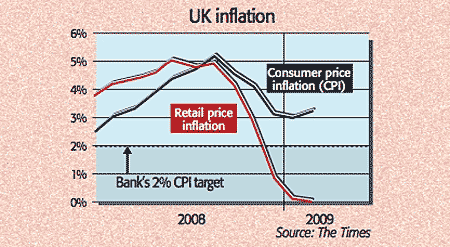
Mervyn King, governor of the Bank of England, has broken a big “taboo”, said Jeremy Warner in The Independent. The Bank normally “minds its own business” on fiscal policy, but this week King essentially said the government can’t afford another fiscal stimulus. This “bombshell” has “blown a hole” in the prime minister’s short-term political strategy, said Ben Brogan on Dailymail.co.uk: he has been trying to rally support for a global fiscal stimulus among the G20.
King “is right not to want to be associated in any way with Gordon Brown’s fiscal train wreck”, as Allister Heath put it in City AM. The budget deficit is already heading for 11%, the sort of figure typically seen in wartime. The worry is that international investors will come to doubt the government’s willingness or ability to get its finances back on an even keel, and their loss of faith in the economy means they could refuse to buy government bonds to plug the deficit and send sterling sharply lower.
Inflation is sticking around
That would mean even-higher inflation, which “to general shock and amazement” is proving resilient, said Edmund Conway on Telegraph.co.uk. Despite all the fuss over the advent of deflation (and fears that it could be accompanied by a long Japanese-style slump), the Consumer Price Index (CPI) defied expectations and rose from an annual rate of 3% to 3.2% in February. Food and petrol prices ticked up, but even stripping out these volatile components the core rate of CPI jumped from 1.3% to 1.6%.
The Retail Price index (RPI), which factors in tumbling mortgage costs, slid to 0%, a 50-year low, although it had been expected to fall into negative territory. It seems “the inflation dragon is not quite as extinguished as many economists would have us believe and deflation is not quite the threat it’s made out to be”, said Andrew Neil on Spectator.co.uk. The main impetus behind inflation is the sliding pound, down almost 30% since mid-2007. Higher imports costs were passed on by retailers.
What next?
Inflation is expected to slide amid impending utility tariff cuts while overall demand is falling away, pulling prices down. Still, CPI may not fall far below target. The drop in sterling points to ongoing upward pricing pressure for “a sizeable chunk of our shopping basket”, said Dan Atkinson on Dailymail.co.uk. Oil has stopped falling; the disappearance of retailers from the high street may offset the slowdown in consumer demand; and the government is printing money, “which can only lead to enormous inflationary pressures”, said Frank Field on Guardian.co.uk. The risk of deflation may have receded. But with the economy shrinking and inflation proving sticky, the buzzword could soon be “stagflation”.